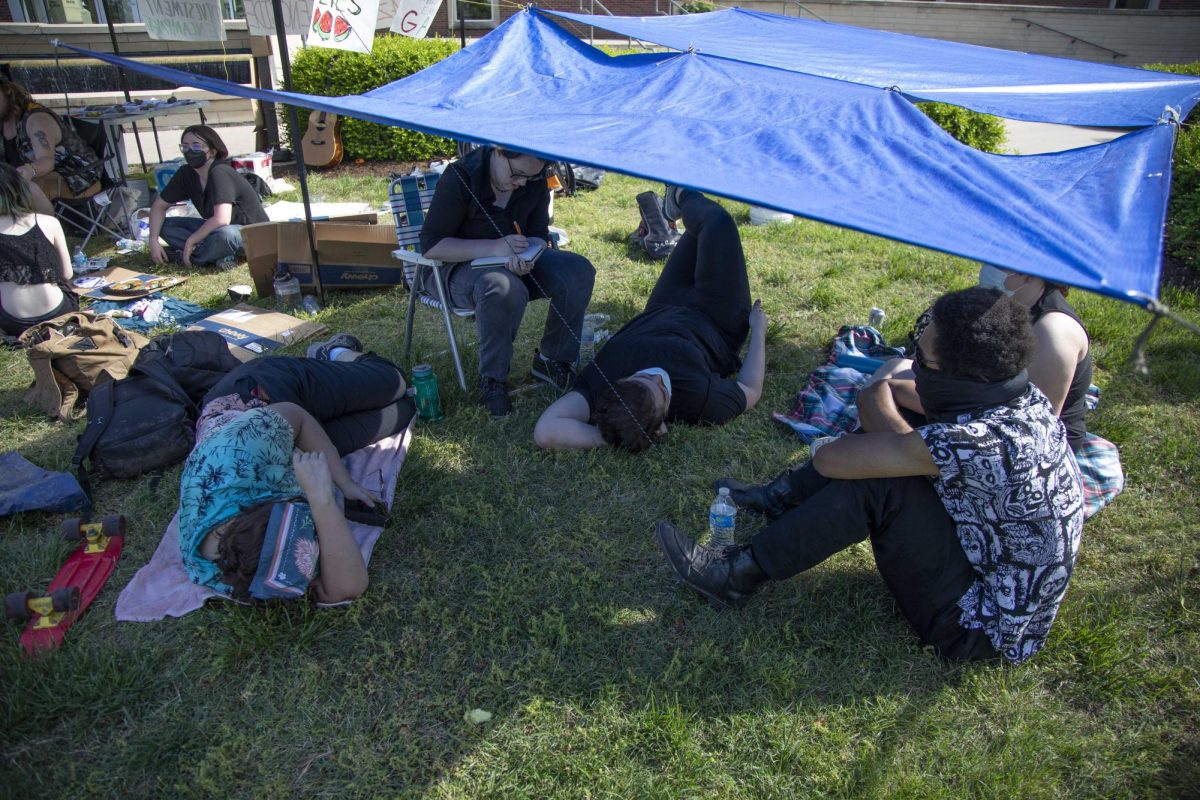French warplanes attack Islamic State in Syria
November 15, 2015
French warplanes began a heavy bombing campaign against Islamic State in Syria late Sunday, less than 48 hours after terrorists killed at least 132 people and wounded hundreds more in Paris.
The French Defense Ministry said in a statement posted on its website that the bombing of Islamic State’s de facto capital, Raqqa, destroyed “a command post, a jihadist recruitment center and arms and munitions depot,” and “a terrorist training camp.” It offered no estimate of casualties.
The 12 French planes were flown from bases in the United Arab Emirates and Jordan, and the mission was coordinated with the United States, the ministry said.
Advertisement
French President Francois Hollande promised Saturday that France would respond without mercy to Friday night’s terrorist attacks, which struck six crowded nightspots in the French capital and a suburb, Saint-Denis.
The French retaliation came as French police acknowledged that they had been wrong when they said that all those responsible for Friday’s attacks were dead.
French police said at least one suspect had escaped, and they issued a Europe-wide alert for the man, Abdeslam Salah, 26, a Belgian citizen who police said had rented a car that was found parked outside the Bataclan concert hall, the scene of the worst of Friday night’s attacks.
Other evidence suggests that at least one more suspect might be at large.
French officials have said the bodies of seven terrorists have been located — six who had triggered their suicide belts and one who was shot by police. Salah would make eight.
But French prosecutors have said the assailants worked in three teams, while witnesses at the locations of the attacks have consistently described three attackers at each, indicating nine assailants in all.
Additionally, three assault rifles were found in an abandoned car believed used in shootings that killed at least 38 people at restaurants, suggesting that three shooters had been in the car. Only one of those shooters has been accounted for, a terrorist who blew himself up.
Advertisement*
The other dead terrorists included three who blew themselves up outside the national soccer stadium and the three attackers thought responsible for killing 89 people at the Bataclan concert hall; two of those killed themselves by detonating their explosive belts and the third was shot by police.
Police did not address the issue of whether other assailants were still at large.
The rise in the death toll — it had been 129 on Saturday — was expected, and it was likely to rise further. An estimated 352 were wounded in the attacks and more than 90 of those remain in critical condition.
France remained on high alert. President Francois Hollande canceled his appearance at the Group of 20 summit meeting, which began Sunday in Antalya, Turkey. The French military said 10,000 soldiers would be assigned to patrol duties around the country.
Parisians remained on edge. Hundreds of mourners who gathered outside the Petite Cambodge and Le Carrillon restaurants, where at least 19 people were killed, scattered at the sight of a suspicious car, and police drew their weapons.
Shortly after that, several thousand mourners gathered at the nearby Place de la Republique to pay tribute fled after what was described as a possible, though unconfirmed, gunshot.
For a second day, theater and museums were closed, and the police and military presence was heavy.
Meanwhile, French and U.S. officials said they had determined that the assailants had been in contact with Islamic State figures in Syria, cementing that group’s claim of responsibility. U.S. and French officials said they had agreed on joint measures to combat the Islamic State, including sharing intelligence on Islamic State targets in Syria and Iraq.
The attackers’ plans for much greater bloodshed were thwarted when two assailants were prevented from entering the crowded Stade de France soccer stadium in the suburb of Saint-Denis where thousands of spectators including Hollande, were watching a match between France and Germany.
Alert security guards stopped one of the assailants when they subjected him to a pat-down as he attempted to enter through the stadium turnstiles. Turned away, he detonated his explosive belt outside the stadium’s Gate D at 9:20 p.m., killing a single passerby.
The explosion could be heard clearly on the broadcast of the game but the crowd inside the stadium was apparently unaware of what had happened, and the game continued for more than another 70 minutes of play to its conclusion.
During that time, two other assailants detonated their bombs outside the stadium — one at 9:30 p.m., the other at 9:53 p.m. — apparently killing only themselves.
The other two teams had more success, were finding greater success.
At 9:25 p.m. three attackers arrived in a car and opened fire at two sidewalk cafes, the Carillon and the Petit Cambodge, which are across a narrow street from one another. Fifteen people were killed.
Seven minutes later, according to witnesses, another car carrying three attackers, pulled up in front of the Casa Nostra Pizzeria and the Bonne Biere bar, which also are across the street from one another. Three men in the car opened fire, killing five. The two cafes are only a few blocks from the Carillon and the Petit Cambodge, though going from one location to the other quickly would require detailed knowledge of the small one-lane streets in the area.
four minutes after that, at 9:36 p.m., according to survivors, three gunmen in a car opened fire at the Le Belle Equipe restaurant, which is a little more than a mile south of the Casa Nostra. Nineteen sidewalk cafe diners are shot to death.
The route between the Casa Nostra and the Belle Equipe would be crowded and difficult to navigate quickly on a Friday night.
Then, at 9:40 p.m., on the Boulevard Voltaire, a terrorist blew himself up in front of a brasserie, injuring a bystander.
One car was found by police in the suburb of Montreuil, about a half-hour away. Three Kalashnikov rifles are found inside.
At the same time, at least three and maybe four gunmen entered the Bataclan theater and started shooting. The Bataclan is about a mile from Voltaire attack. The attackers killed many during the initial assault, but they also seized about 100 hostages and began executing them. The siege at the Bataclan lasted until after midnight, when police stormed in, and two attackers detonated their suicide belts. A third terrorist was shot to death by police, though reports now say he too detonated his belt.
The prosecutor believes the six cafe attacks all involved the same group of attackers. One attacker obviously survived to drive the car back to the Paris suburbs. Witness accounts of the attacks indicate that he would not have been alone.
Advertisement







